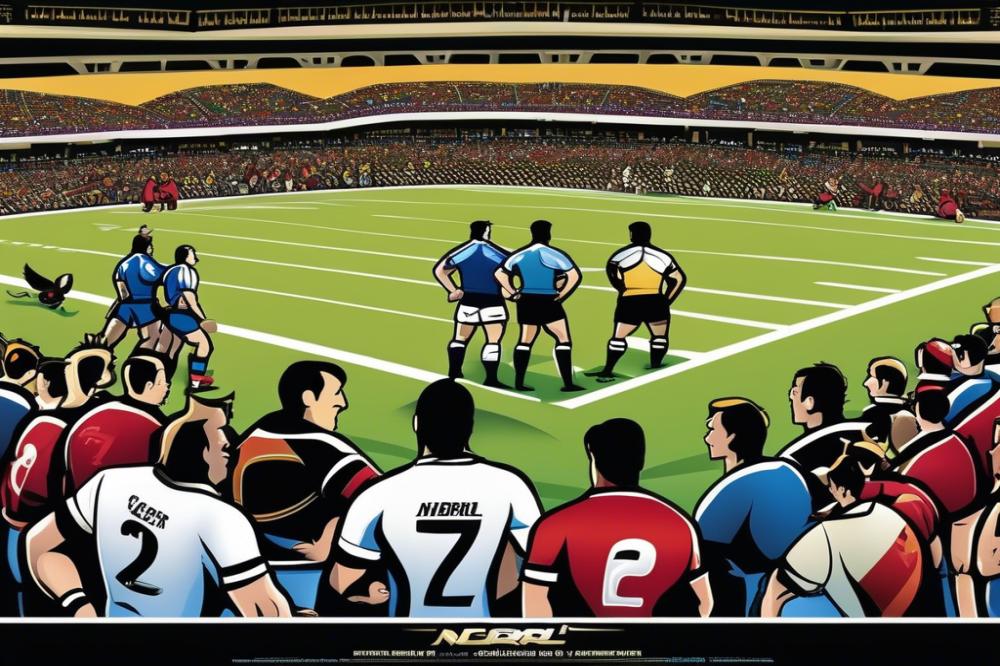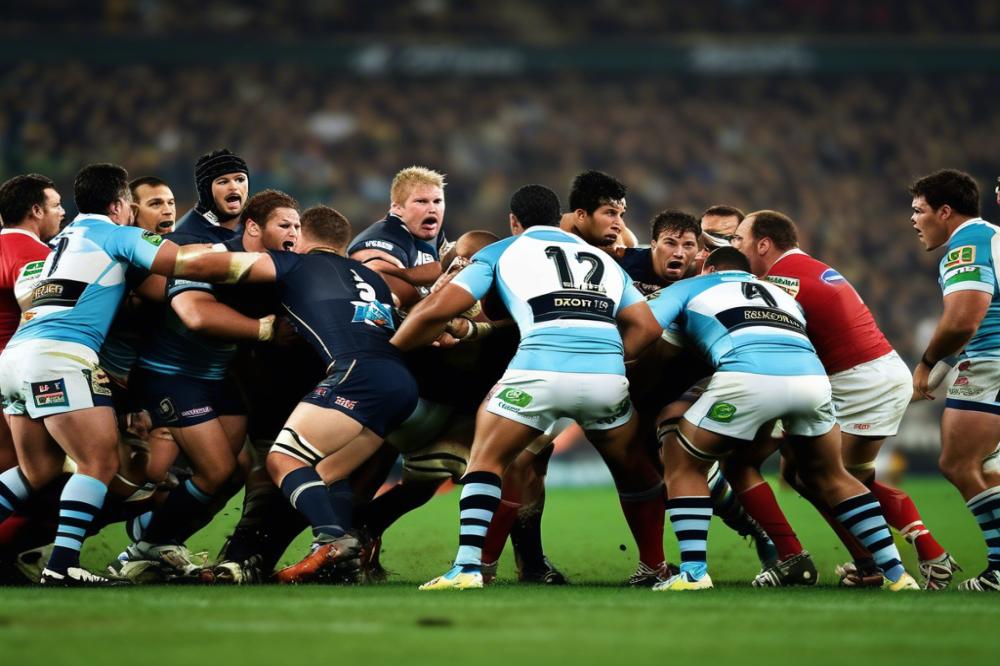Introduction
The landscape of player discipline in the Australian National rugby league (NRL) is currently under scrutiny. The term “Sin Bin Chaos” has surfaced amidst heated discussions. This expression highlights the bewilderment caused by fluctuating policies in rugby league. Fans, players, and officials alike are grappling with inconsistent approaches to match penalties and referee decisions. While aiming to promote fair play, the current system has left many confused.
Recent seasons have seen a spike in controversial player suspensions and on-field incidents. Inconsistencies in discipline policies further complicate the issue, shaking the confidence of teams across the league. The fairness of matches is put at risk when rules seem unclear or unevenly applied. These inconsistencies in enforcement can sway the outcome of a game unexpectedly.
Sports governance bodies, tasked with upholding the integrity of the game, now face an uphill battle. The sin bin controversy has sparked widespread debate, causing uproar in the rugby league community. Fans express frustration over perceived bias and lack of transparency. Such reactions highlight the urgent need for clarity and consistency.
All stakeholders desire rules that are fair and understood universally. Achieving this would restore trust in the NRL’s systems. Addressing these concerns is crucial to maintaining the sport’s integrity and ensuring continued support from a loyal fan base. Until then, player discipline remains a hot topic of concern within the league.
Understanding NRL player discipline

In rugby league, the National Rugby League (NRL) has a specific set of rules and regulations aimed at maintaining fair play and player discipline. Understanding these rules is essential for fans, players, and officials alike. The NRL employs various mechanisms to address discipline, which include match penalties, player suspensions, and managing on-field incidents. These aspects are critical in preserving the integrity of the game.
When a player commits an infraction, referees have the authority to impose match penalties during the game. These can range from minor penalties to major infractions, depending on the severity of the action. A match penalty might result in a player being sent to the ‘sin bin’ for ten minutes, where they cannot participate in the play. This temporary suspension reflects the NRL’s commitment to instantaneous, yet balanced, resolution of player misconduct during play.
In addition to penalties, the NRL can also issue player suspensions after reviewing game footage. These decisions often arise out of more serious breaches of the rules, like dangerous tackles or unsportsmanlike behavior. The goal is to ensure that the competition remains equitable and safe for all involved. However, some individuals argue that these decisions contribute to controversy, particularly when the severity of suspensions is perceived as inconsistent.
On-field incidents have frequently been at the center of controversies in NRL. The decisions by referees during these incidents often influence the perceived fairness of the match. The NRL’s discipline policies rely heavily on the officials’ judgment, which can sometimes result in mixed reactions from fans and pundits. Discrepancies in refereeing decisions can stir public debate, questioning the overall sports governance.
Fans expect clear and consistent rulings to uphold match fairness. When disciplinary outcomes do not align with these expectations, it fuels confusion and dissatisfaction among spectators. The discussions surrounding NRL player discipline underline the complexity of balancing sportsmanship, game rules, and fair competition. These elements collectively shape the playing field and remain a crucial part of rugby league’s ongoing evolution.
The Role of Referee Decisions

In rugby league, referee decisions play a crucial role in maintaining order on the field. However, inconsistent rulings can muddle the clarity of game rules, leading to frustration. Such discrepancies in judgment can make fans question the integrity of the match. They wonder if true match fairness is being upheld when calls differ from game to game.
With each on-field incident, the officials must swiftly decide on possible match penalties. These quick decisions are not always free from error. The audience often observes moments where calls seem unfair or overly harsh, causing a ripple of discontent among supporters. Player suspensions, when not uniformly enforced, stir emotions and debates.
Some instances have brought referee choices into sharp focus. Players argue on-field about the fairness of a call, while fans voice their opinions from the stands. In these moments, the heart of rugby league is tested by its governance. People passionately contest decisions they perceive as unjust or damaging to the game’s spirit.
Recent matches have had their share of controversy. An incident where a player received an unexpected penalty, left audiences divided. They questioned whether the rules were applied correctly. Such moments illustrate the chaos inherent in current discipline policies. Calls for reviews and changes echo through social media and fan forums.
The balance between strict rule enforcement and reasonable judgment is delicate. Ensuring fair treatment for all players remains a significant challenge. Every questionable decision underscores the need for consistency and transparency in refereeing. As the sports community reflects on these issues, they continue to shape the path forward for the NRL player discipline and beyond.
Discipline Policies and Game Rules
The National Rugby League (NRL) keeps a set of rules to maintain order on the field. These rules aim to protect players and guarantee fair play. Yet, in practice, their discipline policies often lead to confusion and chaos.
Discipline policies should integrate seamlessly with the game rules. Ideally, they work to control on-field incidents and promote match fairness. Referee decisions are guided by these rules, influencing the game’s flow and outcome. However, inconsistencies in interpretation can result in unpredictable match penalties and player suspensions.
Consider how the execution of these policies can seem uneven. At times, similar infractions receive different sanctions. This inconsistency causes distress for both players and fans. Clarity is lost, and the perception of fairness erodes.
For example, players sometimes face harsh penalties for minor offenses while more serious infractions are overlooked. This imbalance in punishment damages the league’s credibility. As a result, fan reactions vary wildly, fostering an environment of distrust.
Clear communication between referees and the NRL is crucial. Officials must make split-second decisions that align with the rules. Miscommunication can lead to unwarranted chaos during high-stakes matches. Moreover, sports governance requires a foundation of clear-cut standards.
Efforts to streamline policies are ongoing. Ensuring consistency and transparency should remain the league’s highest priority. Yet, as long as discrepancies persist, confusion will reign.
In summary, the NRL needs to align discipline policies firmly with their game rules. Until then, the ‘Sin Bin Chaos’ will continue to plague rugby league, challenging both its integrity and fans’ trust.
Impact on Fans and Players
Fan Reactions to Disciplinary Actions
Recent shifts in rugby league discipline policies have sparked surprising reactions among fans. Watching games, it seems every dispute or minor infraction leads to significant controversy. Many spectators feel that referee decisions are inconsistent. This inconsistency leads fans to question the fairness of match penalties. Social media discussions are full of heated debates. Some advocate for stricter game rules to avoid confusion. Others argue that the sport is becoming too harsh on players. Too many interruptions might ruin the excitement of the matches. There is genuine worry that the sport’s integrity might be compromised.
Effects on Players
Players feel the pressure more than anyone. On-field incidents have become key points of scrutiny. Young athletes often face suspensions after making errors. This may deeply affect their mindsets. Doubts about fairness in player suspensions can fester among teammates. Constant disciplinary reviews mean players face added stress. Some players worry about their reputation. They fear being labeled as troublemakers over small mistakes. The psychological impact can be enormous for those in the public eye. Playing freely becomes a tough challenge under harsh watchful eyes. Concerns grow about long-term career harm due to strict discipline systems.
Rugby league, at its core, is a passionate sport. Growing complexity in regulating it could scare away the next generation of players. Sports governance must reach a fair balance. Balancing discipline while maintaining fairness is essential to preserve the game we cherish.
Sports Governance and NRL Policies
Strong sports governance is crucial in managing discipline rules. In rugby league, governance bodies must create clear game rules. These rules guide everything from match penalties to referee decisions. However, inconsistency in disciplinary decisions often leads to frustration.
Governance could play a pivotal role in resolving what many fans see as chaos. For example, implementing standardized guidelines for on-field incidents can help mitigate confusion. A well-defined framework would improve match fairness. Policies should provide clear protocols for referees, ensuring consistency.
One major issue is the variability in player suspensions. Fans often witness differing penalties for similar offenses. This can erode trust in the sport. Uniformity in the application of discipline policies should be a priority. By doing so, the NRL can better manage player expectations.
Fan reactions are a key indicator of governance success. When sports governance fails, spectators lose faith. Conflicting referee decisions can lead to dissatisfaction. Clearer guidelines will promote confidence in match outcomes. Enhancing transparency in the decision-making process can further support this goal.
Sports authorities must regularly reassess policies to fit the evolving game landscape. Encouraging open dialogue with players and coaches can yield valuable insights. When rules are clear, both players and officials can perform with greater certainty. Ultimately, this reduces confusion and elevates the rugby league experience for everyone involved.
Bringing Order to Player Discipline in the NRL
The current state of player discipline in the NRL has stirred more confusion than clarity. Frequent rule alterations and inconsistent sin bin decisions have left players and fans bewildered. Sitting in the sin bin, players see their team suffer for uncertainties in rulings. Many feel that the fairness of the game is at stake.
Rugby league thrives on passion and intense competition, but disciplinary inconsistencies disrupt the flow. When pivotal moments in a match revolve around contentious sin bin calls, the whole atmosphere can be tainted. Those watching question if game rules are being enforced uniformly. Players, already under pressure to perform, face additional strain from unpredictable punishments.
A potential pathway to clarity and fairness could lie in comprehensive reviews. Clear and consistent guidelines need to be a priority. Introducing educational sessions for both referees and teams would assist in harmonizing decisions. Additionally, empowering referees with better resources could help minimize disputes on the field.
A transparent review system might ensure decisions are perceived as fair and well-founded. A genuine commitment to improving clarity will enhance the rugby league experience. Providing fans and players such assurance will help restore their confidence in the fairness of the game.



